Clippens pits
Available evidence suggest that Merry & Cunninghame (iron and coal masters with substantial mineral interests throughout the West of Scotland), established coal and ironstone workings at Clippens during the late 1850's. Worker's housing was built by the company at Clippens Square, known locally as Balaclava following the victory in the Crimean war. The Clippens pits appear to have been referred to sometimes as the Balaclava pits.
Successive editions of Mineral Statistics list "Clippens" as being worked as a colliery by Merry & Cunninghame (in 1870, 1871, and 1874) and by Clippens Shale Oil Co in 1877. It is listed in 1879 as worked by Clippens Oil Co. for ironstone and coal (Wm. Archibald, manager) and for ironstone alone in 1885. There appear to have been at least three Clippens pit. The index of mine abandonment plans list abandonment of coal and shale workings at Clippens No.2 in 1878, of coal workings at Clippens No.1 in 1880, and coal and shale workings at Clippens No. 3 in 1883. Watson's Directory for Paisley lists Clippens coal, shale and ironstone pits, James Scott proprietor, from 1876 to 1881, listing Clippens Oil Co. Ltd as proprietor from 1882 to1884
When the Clippens Mineral Oil Co. established their Clippens oil works in 1872, they contracted with Merry and Cunninghame for the supply of oil shale. The Clippens Oil Co. purchased Merry & Cunningham's Clippens pits in 1876, and continued mining operations for coal, shale and ironstone until at least 1885.
The location of the Clippens pits (and indeed the precise location of Clippens Oil Works), remains uncertain. The "Clippins ironstone pit" shown on the 1857 OS map, and marked as "old shaft" on the 1895 OS map, seems likely to be Clippens No.1 pit. OS maps show no further shafts that might represent Clippens No.2 & 3 pits, but it seems possible that one or both pits lay to the north east of No.1 pit, within the large area of derelict ground around the supposed site of Clippens oil works (centred on 55.853269, -4.498055).
Location maps
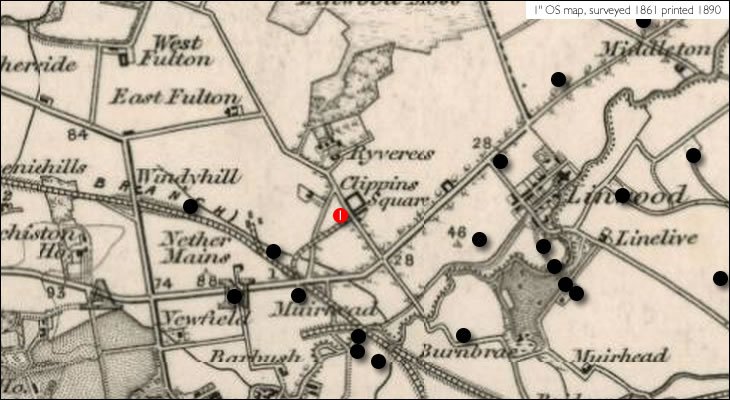
Pits plotted on 1" OS map (1890). Possible Clippens pits marked red, others black
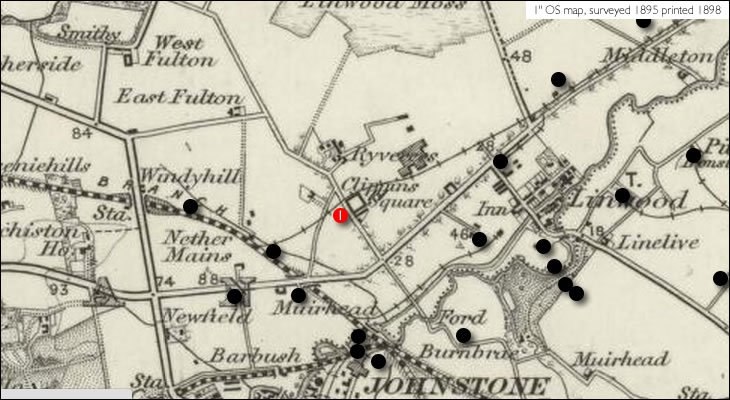
As above, plotted on 1" OS map, printed c.1898
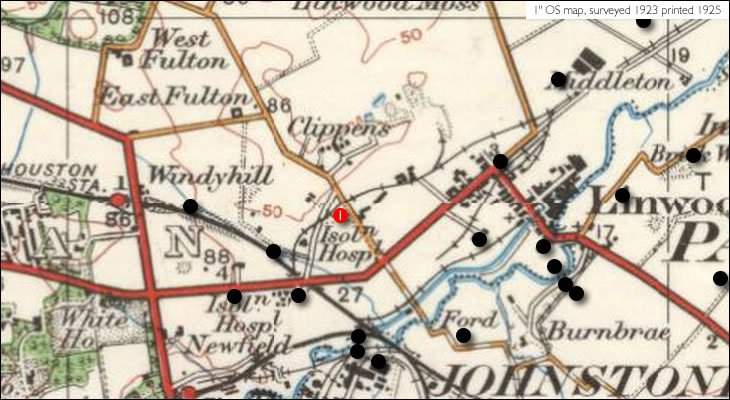
As above, plotted on 1" OS map, printed c.1923
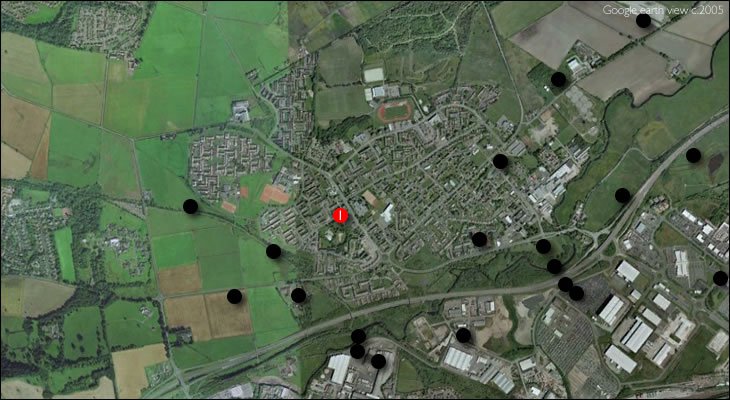
As above, plotted on Google earth image
Key to markers on the location maps.
- (55.847433, -4.504020) Presumably the site of Clippens No.1 pit
Detail maps
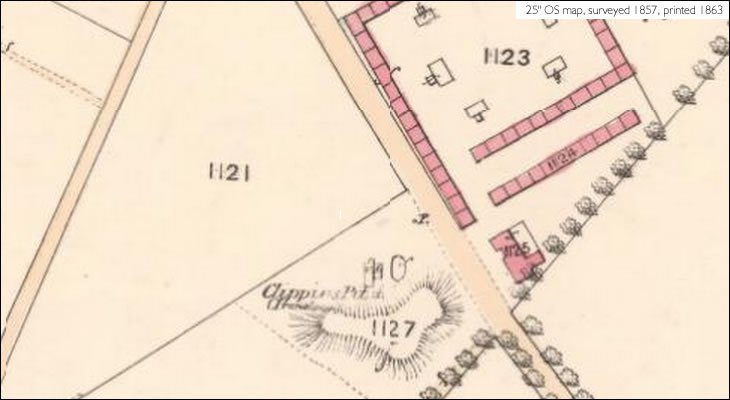
25" OS map c.1857 showing "Clippins ironstone pit"
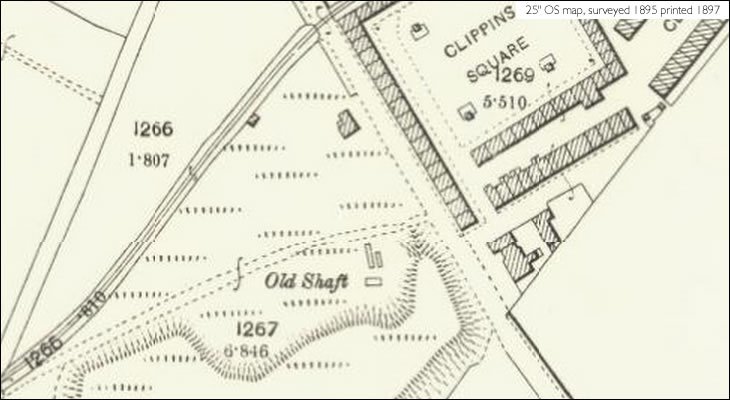
25" OS map c.1895, same area as above showing disused pit, presumably Clippens No.1
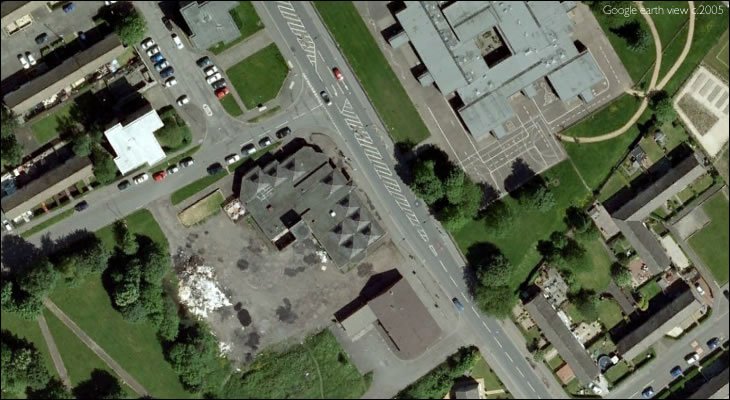
Google earth image c. 2005, showing the same area
BALACLAVA. Fatal Accident.—An ironstone miner, named David Caven, 32 years of age, in the employment of Messrs. Merry & Cunninghame, at No. 1 ironstone Pit, Balaclava, was accidentally killed on Friday morning. The particulars of the accident are as follow: —At half-past five o'clock there were a number of miners sitting at the pit mouth waiting for the cage coming to take them down. Caven was sitting on a hutch that was standing on the plates at the mouth of the pit, when he rose to go down. He lifted some pit wood to take with him, and setting his foot on the place where the back balance of the pump works, it gave way, and fell in headlong below the crank of the balance which was in motion at the time, and coming down, forced him along with it. Daniel Kerr, another miner, seized him by the leg, but could not manage to pull him from below it. He lived only a short time after he was taken from below the crank. The back-balance, it is stated, had been newly put on. and the place was not finished, which afforded very little room to pass, there being a number hutches standing at the mouth of the pit.
The Paisley & Renfrewshire Advertiser, 27th October 1866
.......
KILBARCHAN - Fatal Result of an Explosion in Ironstone Pit. - A miner, named John Bell, residing in Clippens Square, Kilbarchan, died Sunday from the effects of injuries received in Clippens No.2 ironstone pit on the 8th inst. Bell had been sent forward to the workings by the oversman to fill a hutch with ironstone, and as he was proceeding to do so, with his naked lamp, the gas which had collected during the night exploded, and was burned on the face, bands, and body. At first he appeared to getting on favourably, but he became worse the 11th inst., and died on the 10th day after the accident.
The Paisley Herald and Renfrewshire Advertiser, 23rd March 1867
.......
Mischievous Conduct.—At the Justice of Peace Court, on Wednesday—before Robert Eaglesham, William Wallace, jun., miners, Patrick Harkin, Thomas Neill, Daniel M'Dowd, and Daniel M'Dougald, miners' drawers, were fined 6d each, or seven days' imprisonment, for a piece of wanton mischief they committed 31st January, at No. 2 Balaclava ironstone pit, belonging Messrs Merry & Cunninghame. They had dragged a number of hatches to the top of blaze hill, and then hurled them to the bottom. In their descent they struck against each other, and were much damaged.
The Paisley & Renfrewshire Advertiser, 13th February 1869
.......
STOPPAGE OF CLIPPENS SHALE OIL WORKS.— These extensive works, belonging Messrs John Binning Co., have stopped work consequence of the strike at the shale mines at Balaclava, belonging to Messrs Merry & Cunninghame. All the produce from these pits is by contract sent to Messrs. Binning, and the supplies being stopped, the works have to cease operations. A large number of men will be thrown idle.
Paisley Herald and Renfrewshire Advertiser, 15th May 1875
.......
EXTENSIVE SALE OF MINES -We understand at that Mr. Scott, Glasgow, one of the partners of the Clippens Shale Oil Company, has purchased the whole of the ironstone and coal mines at Clippens, with the stock, plant and. properties, from Merry& Cunninghame. Mr. Scott has also become the sole proprietor of the Clippens Shale Oil Company.
The Glasgow Herald, 4th January 1876
.......
PAISLEY - SERIOUS ACCIDENT. - On Monday morning, two labourers, named Charles Kerr and Patrick Quinn, residing in Linwood, employed at the Clippens Brick Work, whilst engaged emptying a brick-kiln, were severely injured by the roof falling in on them. Quinn was able to walk home, but Kerr had to be removed to the Paisley Infirmary, where he lies in a precarious condition.
The Glasgow Herald, 9th May 1877
.......
JOHNSTONE.--Clippens Collieries - On Saturday afternoon, at No. 1 Millilken Pit, belonging to Mr of James Scott, of the Clippens Collieries, in presence of a large number of gentlemen connected with the collieries in the district, King's patent detaching hook for preventing overwinding, and its destructive and frequently fatal consequences, was put to the test. Mr. Archibald, the manager, gave the signal for an overwind, when the cage ascended at the rate of 525 feet per minute, when the detaching hook attached to the rope passed through the catch-plate, and the rope at once disengaged, leaving the cage securely suspended with but a very slight shock apparently. The detaching hook. was then examined in all its parts, the cage again connected, and everything in working order in 6 minutes. This trial, which was we understand is the first to have taken place in the West of Scotland, gave entire satisfaction.
The Glasgow Herald, 20th August 1878